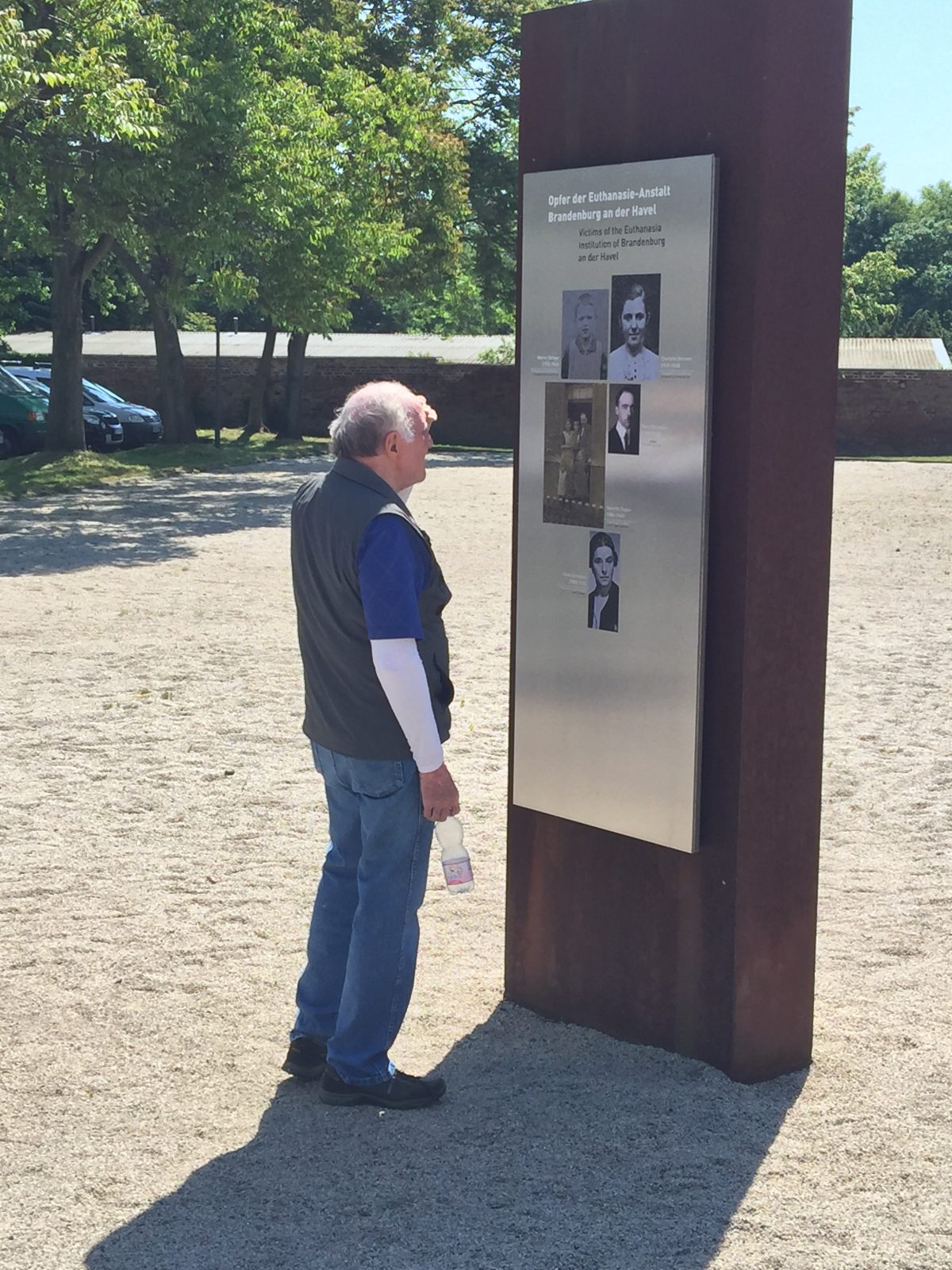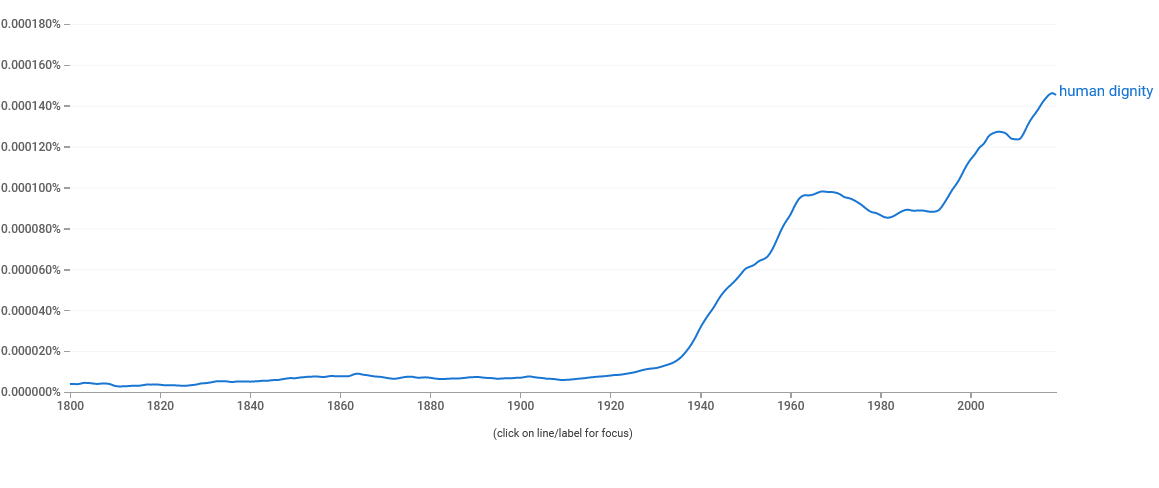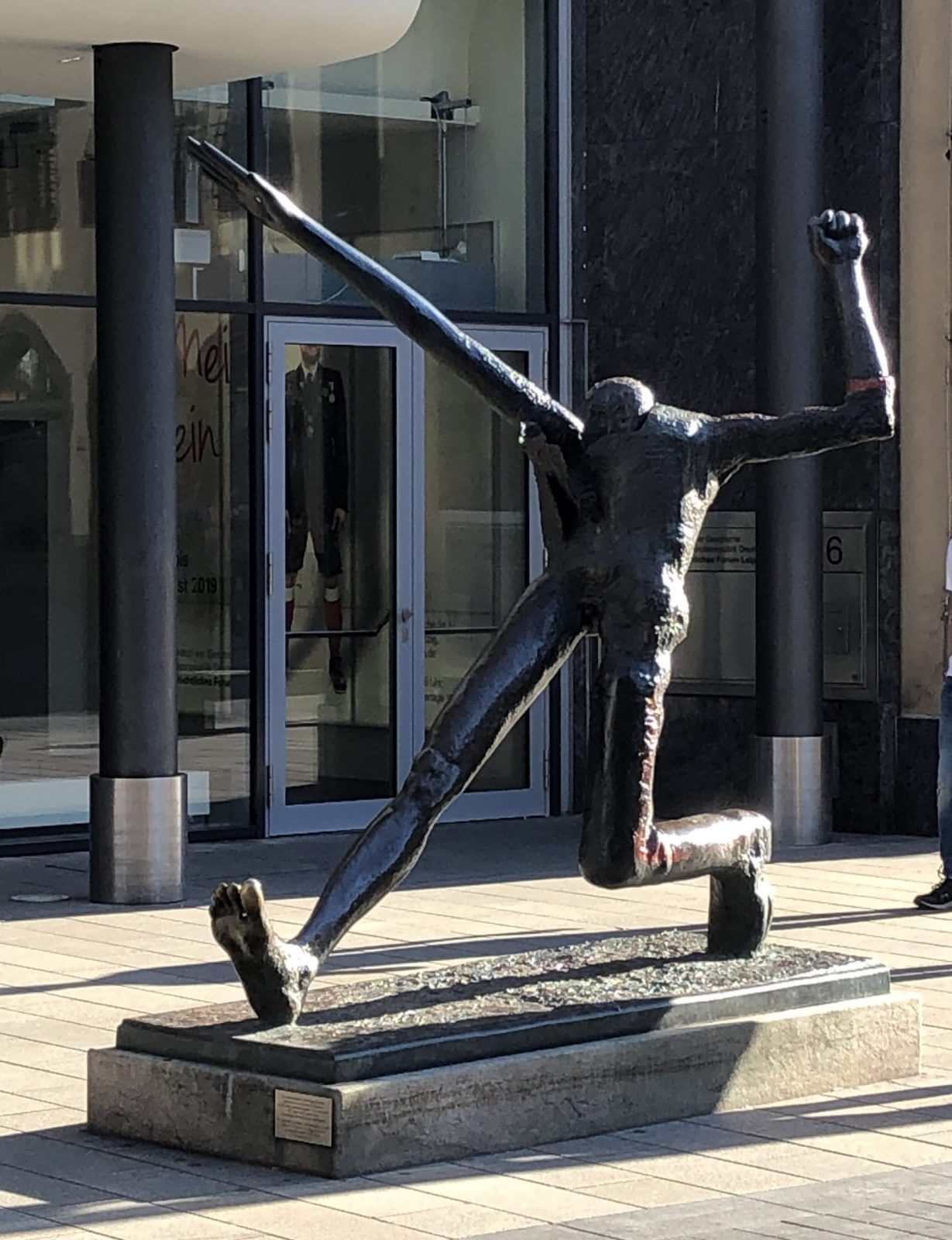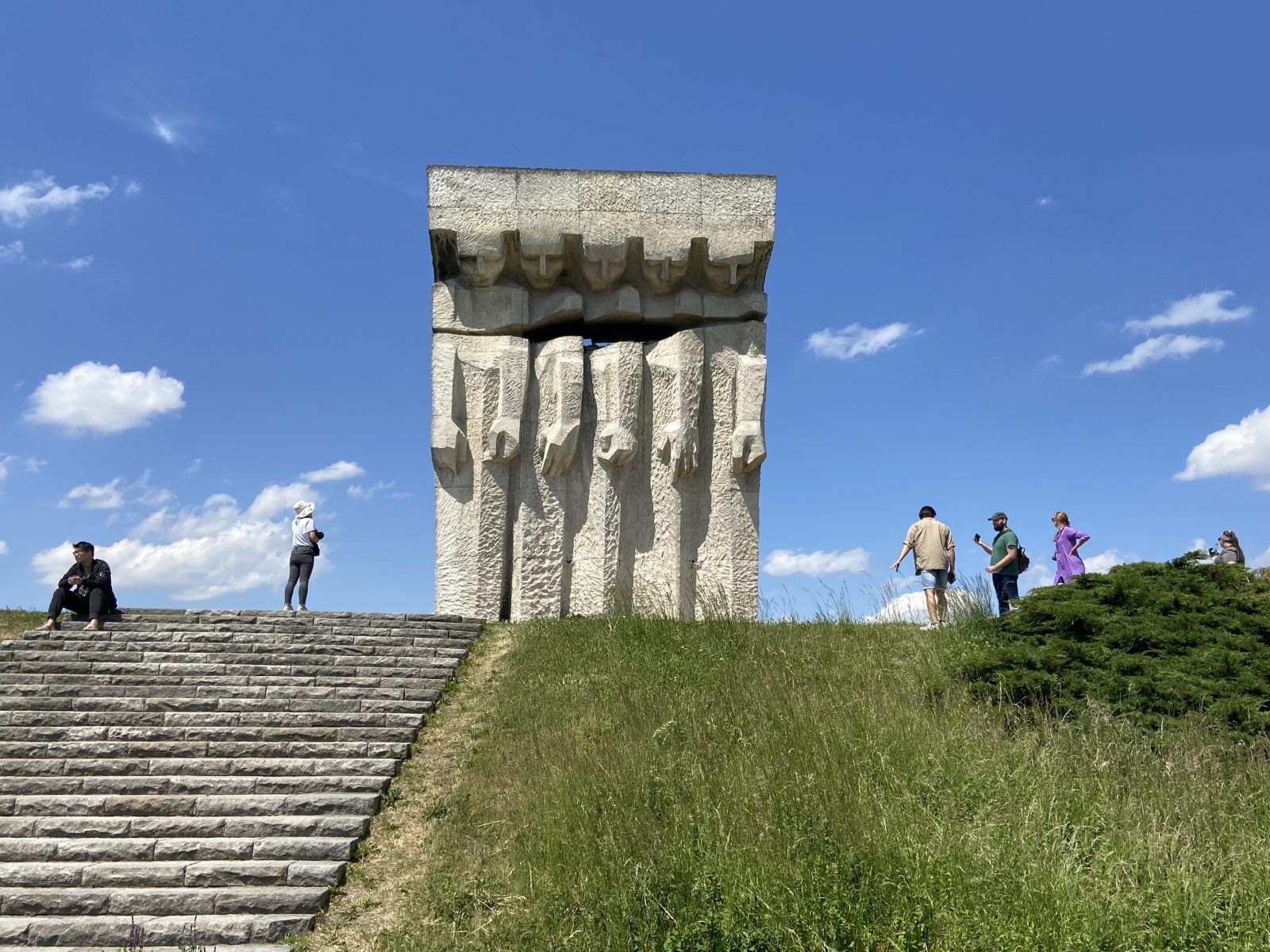(Talk delivered to AUHP students at Nov, 2022 orientation meeting.)
As you know, the honors experience here at Asbury is a themed enrichment program – “Studies in Virtue and Human Value.” This evening, I want to invite you to walk along with me as we explore our theme for a few moments.

Our program’s two guiding questions are, “What gives humans value or dignity?” and “What are the implications of finding value in ourselves and others?” We can start by recognizing that most everyone feels like they have value, it’s instinctive – I am somebody, and my life is meaningful, and not just to me. It seems to matter in some larger sense as well. Furthermore, most people these days are quick to affirm their belief in the dignity of all people. For instance, we are universally aghast when we learn about the specifics of how disabled people were treated by the Nazis. (To the right is a picture of my father reading a placard as we visited the Brandenburg Euthanasia Memorial back in 2018. This place, by the way, is the first place the Nazis began to “cleanse” the German germplasm by exterminating massive numbers of their own citizens, the physically and mentally handicapped as well as “asocials,” an umbrella category capturing anyone who was deemed to be socially awkward or difficult for the state to manage. This is one of the places where, early-on in the period of Nazi mass extermination, better killing efficiency was sought; in fact, gas in the form of carbon-monoxide was first used here.)
But just beneath our feelings and beliefs in the value of people lies the grounding question of “why.” Why do we have this feeling and belief that we have value?
Perhaps, before we go much farther, we should first get to the “what” of intrinsic human value. What do we mean by that term? According to the Center for Bioethics and Human Dignity, “Human dignity is the recognition that human beings possess a special value intrinsic to their humanity and as such are worthy of respect simply because they are human beings.”1 Of course, there are other definitions of human dignity, and the distinctions between them can be very important and quite telling of the underlying assumptions of those crafting the definition, but this is a good one to get us into the topic.
“Human dignity is the recognition that human beings possess a special value intrinsic to their humanity and as such are worthy of respect simply because they are human beings.”
Center for Bioethics and Human Dignity
Back to the question of “why.” One way to pose the “why” question is like this: is the idea of human dignity something we invented or something we discovered?
Was it built by the buzzing hive-action of a collection of human minds over a period of time like so many of our cultural customs and conventional practices? Is this something we have collectively thought up, perhaps to help us live peaceably with one another? After all, we have fashioned all sorts of important and powerful ideas to facilitate, standardize, and attempt to harmonize our social interactions. For instance, we have developed a vast assembly of customs for greeting one another and demonstrating mutual respect; these vary across the planet. We have also created ideas designed to manage the civic relationships between peoples, entire people groups. For example, we have created nation states (as well as the peace treaties between them), various types of government, and innumerable laws; there are also a collection of societal norms and expectations that have emerged over the centuries. Though these invented entities often fail and are discarded and have to be replaced, the reason they exist is to protect people, or at least some people, and to promote human flourishing.
Turning to our psychological selves, an honest inside look will reveal that much of our claimed personal and professional identities are manufactured, not to mention the labels that we often attach to ourselves and which we encourage others to validate (e.g., athlete, poet, friend, and Libertarian). Isn’t the social self largely an invention, its fluctuation across time and situation serving as an ever-present reminder of this? So much of who we claim to be to others is of our own making. Not that these claims are not true to us, or true in some way based on how we choose to define, measure, and assign these labels. But are they objectively, unambiguously true? Might the subjectivity of self-definition also be true for our claim of intrinsic value?
Or take our sense of morality, of right and wrong; is it also a product of human engineering? This is an interesting question. According to the recent book “Science and the Good” (2018), most current scientists who study morality have given up on finding a bridge between the “is” of normal moral behavior (that is, what people usually do) and the “ought” of what we should do, deciding that there may not be any real oughts out there to be discovered. What “is” could just as easily have ended up been something else. This perspective invites us to consider that perhaps our moral lives are not angled toward some objectively true moral dimension, some objective “good.” No, perhaps our moral principles are the unintended artifacts of a convoluted and quite contingent history. In other words, rewind human history and play it out again, says this perspective, and we are likely to find ourselves living within the network and tension of a rather different set of moral principles and obligations. Well, perhaps we, like the authors of this book, should be suspicious of some claims of invention. However, one thing seems clear, many of the societal structures that give shape to our communities, and many of the concepts that give our individual lives meaning and purpose, the features of life we use every day to convey our value to others, are mere social constructions. They are inventions, and even though they sometimes wield immense power, they are not discovered truths. Might this also hold for our sense of personal value and dignity?
“Human Dignity is a phenomenon of human perception.”
Steven Pinker
Or was human dignity discovered – like a previously uncharted pacific island or a principle of reality uncovered through reflected experience like the Pythagorean theorem or gravity, or perhaps some important physical substrate of biological life like the Y chromosome spotted under a microscope. These features of reality just exist. They were either woven into the original fabric of the universe or they showed up sometime later; but whichever the case, they exist without a whit of care for human wishes or concerns. And we eventually just happened upon them; we discovered them. Unlike inventions, which we can manipulate and adjust as our need for them changes, things that are discovered are stubbornly independent of our hopes and desires. They simply are what they are. Take ‘em or…..well, you have to take ‘em. That’s the point. There is no choice in the matter. If humans genuinely possess intrinsic value, then there is nothing one can do to change that basic feature of reality. Try though one may.

As we think about this question, note that a vast majority of currently existing laws that appeal to human dignity for their existence, as well as virtually all of the organizations that have the defense of human dignity in their mission statement have emerged recently, since the end of the Second World War. Also, note that the phrase,” human dignity,” is largely a post-World War II expression. In support of this claim, I offer an “Ngram” of the phrase which shows that it’s usage in English books was virtually non-existent until the 1940’s. The term “human dignity,” as it turns out, is a rather contemporary phrase.
Furthermore, it is rather easy to argue that the moral circle has been greatly expanding since the end of that terrible war, correlating well with the dramatic increase of the use of the term. I would guess that when our great-grandparents were growing up, they could not have imagined a world where so much effort and resource was given to such things as prenatal and neonatal healthcare, widespread educational opportunities (including for those suffering from autism or cognitive challenges), and let’s not forget the increased access and opportunities for those with physical disabilities. An example of this is the emergence of and global support for the Paralympic Games; an offshoot of the Olympics involving thousands of competitors from dozens of countries around the globe; these games were first held, by the way, in 1960.
As you think about this question, let’s revisit the definition one more time, “Human dignity is the recognition that human beings possess a special value intrinsic to their humanity and as such are worthy of respect simply because they are human beings.” Notice it reads “recognition.” Is that true? Is it something that has always been there just waiting to be recognized, or is it an imagined idea with which we have eventually come to agree on?
After struggling with this question for a bit, some might wonder, “Why does it matter whether it was invented or discovered? Secular humanism says we invented it, orthodox Christianity claims it was discovered, but in the end, isn’t it just important that it now exists?” Let’s just be thankful and not worry about it.
Well, for several reasons, I suspect that it does matter. Let me offer a couple for current consideration. First, I think it matters to us privately – in that place where only we have access, that inner world. I believe it is important for us to know if our sense of having value is something that is actually real, or if it has just been assigned to us through a kindhearted social contract. Knowing what to believe about our sense that we have value matters a lot to us, or at least I believe it will matter to us at critical times in our lives; when tragedy strikes, when we experience the pain of being ostracized, the loss of a someone close to us, or a frightening diagnosis. Is my sense of personal meaning resonating anywhere beyond this vaporous fleeting life, beyond the inside of my own head, and beyond the words of a few well-meaning others? Is it anchored in something transcendent?
Secondly, it matters because it influences how we come to think of others, and how we invite others to think of others. And this taps into our program’s second great question – in addition to “What gives people value?” is the question, “What are the implications of finding value in ourselves and in others?” Now, obviously, we are socialized to value others; whether that value is ultimately real or just imagined, we tend not to contemplate. And there are governmental and legal protections of human dignity that are designed to kick in and offer protection when problems arise. But of course, these are human inventions; supporters of these efforts hope they will function as designed and protect the marginalized. However, they are clearly just human contrivances, agreements made amongst ourselves. We learn how well they work when powerful economic, political, social, and biological forces come sweeping through our communities and cultures. Will these laws and protections be able to bear the weight of the pressure being placed on them during times of crisis? This is an open question. (And the answer may very well depend on whether we believe human dignity to be invented or discovered.)
Outside of these larger legal and societal structures, however, we each need to decide for ourselves how we are going to view “the other;” particularly “the different other;” the other we do not understand and of which we may be scared. How we answer the question of “invention or discovery” will determine how seriously we will take the issue of the treatment of the marginalized and the helpless when powerful forces come pressing in on us and on our circles of influence. After all, inventions can be adjusted and refit for changing needs and changing situations. Not so for that which is discovered. We may wish reality were different, we may even get ourselves and others to all agree that reality is or should be different, but those beliefs and claims, even if shared by the majority, have no power to change the truth of a discovery.

Here is an interesting piece of art found in a handful of locations around Germany. It is called, in English “The Step of the Century” and it depicts how people have been dehumanized and mistreated as a result of the two most dominant socio-political movements of the previous century – namely Nazism and Communism. Notice the straight outraised hand and the bare foot on the right side, symbolizing the nationalistic fascism of the Nazis and the experience of the concentration camps – I think it is not coincidental that this is on the right side of the body. Also notice the military boot and the raised fist on the other side, symbolizing the violent communistic revolutions that unfolded in various places across the century – not coincidentally, I might guess, these features are found on the left side of the body. But look at the torso of the person. It is collapsed and hollowed-out, the head sunken into the empty chest cavity. I’m reminded of C.S. Lewis’ challenging chapter in “The Abolition of Man” entitled, “Men Without Chests.”
To conclude, let’s look at a story from the book of Genesis. In the 4th chapter we see the first interaction between a now fallen humanity and the God of the Bible. You know the story; there is no need to retell it. However, let’s consider just the questions that were asked between God and Cain. In verses 6 and 7, we find the first exchange. Here God asks Cain, “Why are you angry? Why is your face downcast? If you do what is right will you not be accepted?” It’s an interesting set of questions. Unpacking them might give us some insights into the fallen human psyche, and the angst and frustration that plague it. We are, after all, the most discontent of all species – we don’t exactly know how things should be, but we know that the status quo is not it. So, just why are we angry? What is the cause of our discontent? Like Cain, are we sure that it is others? Then a couple versus later, after the terrible deed has been done, God asks Cain another question. He says, “Where is your brother?” – a probing question of relationship and responsibility. And here Cain responds to God with a question of his own. He says, “Am I my brother’s keeper?” A denial of responsibility and “stay-in-your-lane” accusation all-in-one. (The chutzpah of Cain is striking, isn’t it?) However, what I find so peculiar is that God does not directly answer Cain. His question just hangs there in the air. The non-answer invites us all in. Are we supposed to be our brother’s keeper? I believe the non-answer also invites us to consider the possibility that God, valuing people as he does as his image-bearers, has chosen to use the narrative of the remaining span of 66 books to offer his resounding answer. Perhaps, just perhaps, the answer is more important than the utterance of a few words. I want to be careful here because words have special meaning in the Christian story. Words, it is said, were used to speak the universe into existence, and to raise Lazarus from the dead. Also, I’m reminded of Martin Luther’s powerful hymn “A Mighty Fortress is our God” which informs us that in the fullness of time “one little word [from God] will fell him” – i.e., Satan. But in this situation God is not wanting to impose his will on creation or on Satan, he is wanting to show Cain and to show us how to live, he is wanting to move our hearts, to persuade our will – for us to choose to be our brother’s keeper. In matters of the heart, perhaps actions speak louder than words. Recall that the Christian story of redemption climaxes in an act – a selfless, demonstrable and necessary act. No, he doesn’t answer Cain in words at that moment – but perhaps this exchange with Cain sits at an important fulcrum in the history of humanity, where on one side we have a fall and a denial of responsibility – and on the other we have the rest of revealed scripture and the rest of human history.
But though he does not directly answer Cain’s question, God is not done with him. He asks him one more question. In verse 10 he says four words that shake me to my core – because I don’t want to answer them. He asks, “What have you done?” What a heavy and haunting question. It is a question that brings into sharp focus the thematic questions of our honors program, and it underscores the importance of determining the ultimate grounding for the claim of human value and dignity. Is it an invention or a discovery?

1The Center for Bioethics and Human Dignity. https://cbhd.org/category/issues/human-dignity
Hunter, & Nedelisky, (2018). Science and the good: The tragic quest for the foundations of morality. Yale University Press.
Pinker, S. (2008). The Stupidity of Dignity. The New Republic. https://newrepublic.com/article/64674/the-stupidity-dignity